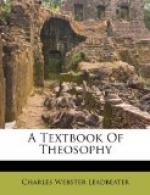Whenever he finds a struggle going on within him he remembers that he himself is the higher, and that this which is the lower is not the real self, but merely an uncontrolled part of one of its vehicles. He knows that though he may fall a thousand times on the way towards his goal, his reason for trying to reach it remains just as strong after the thousandth fall as it was in the beginning, so that it would not only be useless but unwise and wrong to give way to despondency and hopelessness.
He begins his journey upon the road of progress at once—not only because he knows that it is far easier for him now than it will be if he leaves the effort until later, but chiefly because if he makes the endeavour now and succeeds in achieving some progress, if he rises thereby to some higher level, he is in a position to hold out a helping hand to those who have not yet reached even that step on the ladder which he has gained. In that way he takes a part, however humble it may be, in the great divine work of evolution.
He knows that he has arrived at his present position only by a slow process of growth, and so he does not expect instantaneous attainment of perfection. He sees how inevitable is the great law of cause and effect, and that when he once grasps the working of that law he can use it intelligently in regard to mental and moral development, just as in the physical world we can employ for our own assistance those laws of Nature the action of which we have learnt to understand.
Understanding what death is, he knows that there can be no need to fear it or to mourn over it, whether it comes to himself or to those whom he loves. It has come to them all often before, so there is nothing unfamiliar about it. He sees death simply as a promotion from a life which is more than half physical to one which is wholly superior, so for himself he unfeignedly welcomes it; and even when it comes to those whom he loves, he recognizes at once the advantage for them, even though he cannot but feel a pang of regret that he should be temporarily separated from them so far as the physical world is concerned. But he knows that the so-called dead are near him still, and that he has only to cast off for a time his physical body in sleep in order to stand side by side with them as before.
He sees clearly that the world is one, and that the same divine laws rule the whole of it, whether it be visible or invisible to physical sight. So he has no feeling of nervousness or strangeness in passing from one part of it to another, and no feeling of uncertainty as to what he will find on the other side of the veil. He knows that in that higher life there opens before him a splendid vista of opportunities both for acquiring fresh knowledge and for doing useful work; that life away from this dense body has a vividness and a brilliancy to which all earthly enjoyment is as nothing; and so through his clear knowledge and calm confidence the power of the endless life shines out upon all those round him.




